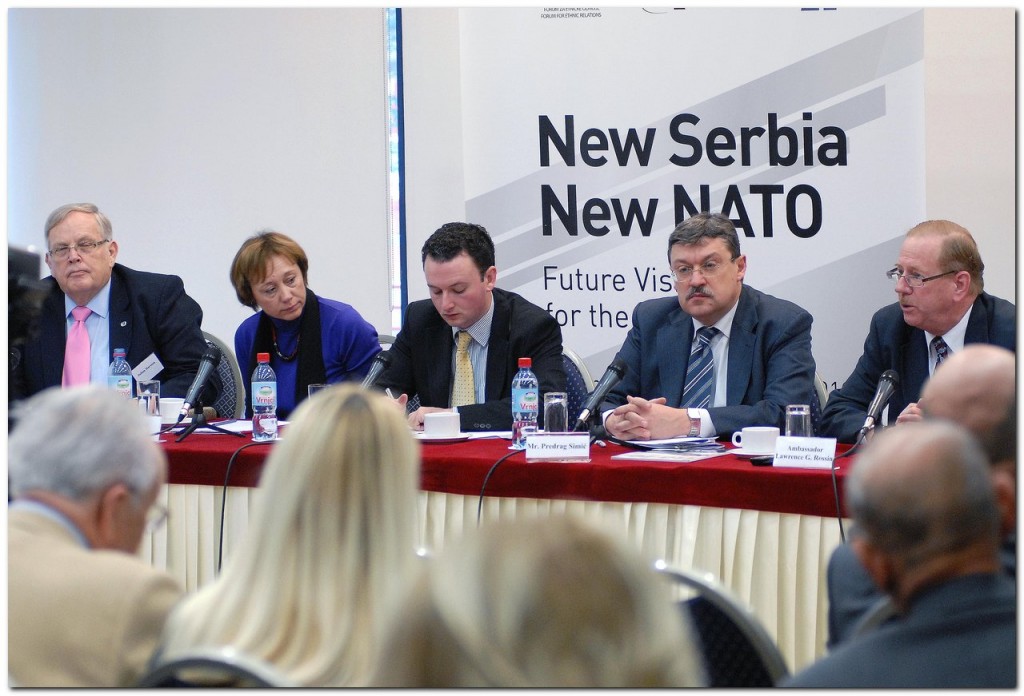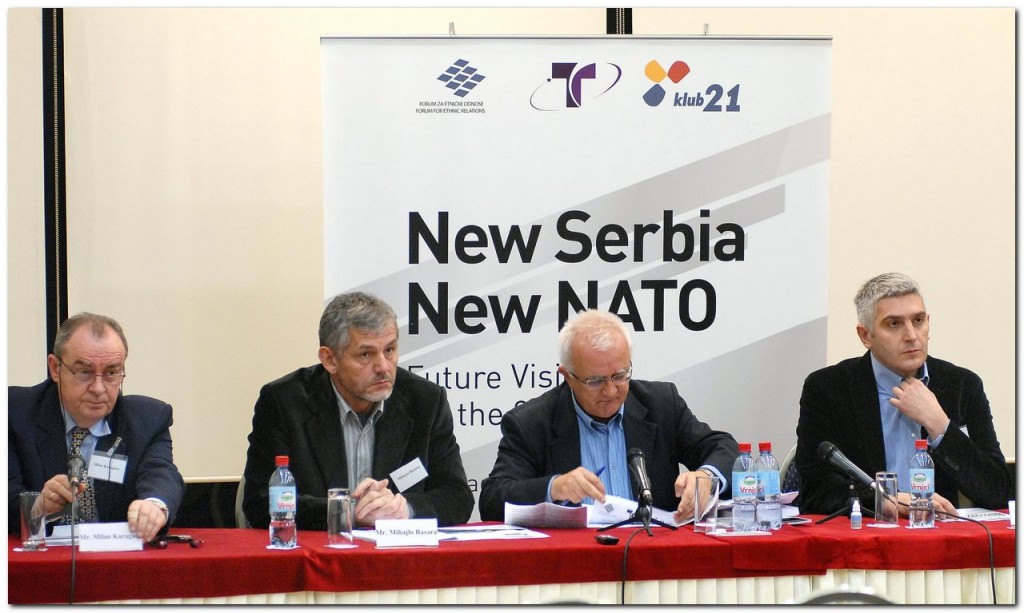New Serbia, new NATO
TransConflict Serbia, in conjunction with the Forum for Ethnic Relations and Klub 21, organized a conference, entitled ‘New Serbia, new NATO – Future Vision for the 21st Century’, on 3rd and 4th December, 2010.
NATO’s new Strategic concept, which was adopted during the Lisbon Summit in late-November, has been discussed and debated today during an international conference, entitled “New Serbia, new NATO – Future Vision for the 21st Century”.
During the opening panel, Ambassador Lawrence Rossin, NATO’s deputy assistant secretary-general for operations, emphasized that “today’s threats are transnational…and can require both a military and civilian response…international terrorism, cyber-attacks and nuclear proliferation are all challenges which respect no borders and the consequences of which can be global in scope.”
Ambassador Rossin believes that the “new Strategic Concept lays out how NATO can achieve the core mission of collective defence” through three main priorities – investment in modern capabilities, deeper engagement with the wider-world and more rapid reaction to threats through streamlined structures and processes.
The Czech Republic’s Ambassador to Serbia, Hana Hubáčková, stated that “today’s peaceful and stable environment in the Euro-Atlantic area is not what might or even should be taken for granted…NATO is a value-based and mutual solidarity-based community… [and] it is the strength of this quality that makes the Alliance an organization continuously relevant for all its members.”
For Ambassador Hubáčková, the new Strategic Concept “represents a huge impetus for further transformation of NATO into a more modern, efficient and capable alliance.” The Strategic Concept “adheres an appropriate prominence to NATO’s partnership with non-member countries”, however the challenge for NATO is to translate the new Concept into “concrete steps”.
In closing, Ambassador Hubáčková emphasized how “Serbia will be an important partner…[however] it is up to Serbia to decide on the depth, intensity and substance of its partnership relation with NATO and it is only Serbia that can limit herself, as it is the case for all other partners.”
Julian Harston, the former head of the UN office in Serbia, argued that “NATO is in flux, the [Strategic] Concept papers over the cracks, but does little to give really clear picture of where NATO will be in five years.” For Harston, the new Strategic Concept ignores “the resource crisis that the Alliance is going through and will suffer for the foreseeable future.”
Given the inherently divergent core interests of its member states, Harston wonders “what underlying threat will unify NATO in the decade ahead to galvanize the alliance into making the sort of investments and reforms that the Strategic Concept stipulates.” Looking ahead, Harston identified the resurgence of Russia, the proliferation of weapons of mass destruction and radical Islam as three of the main security challenges of the twenty-first century.
Whilst acknowledging both the legacies of NATO’s 1999 bombing campaign and the fact that Serbia had never been a member of any military alliance, Harston called on Serbia to get the maximum out of the Partnership for Peace Programme and wait to see how NATO develops.
Dr. Predrag Simic, professor of the Faculty of Political Sciences, emphasized Serbia’s Euro-Atlantic orientation, without neglecting Russia which is an “unavoidable ingredient in the Balkans”.
The two-day conference was organized by the Forum for Ethnic Relations, TransConflict Serbia and Klub 21, and supported by the Czech Ministry for Foreign Affairs, the Balkan Trust for Democracy and NATO Public Diplomacy Department.
For media coverage of the conference (in Serbian), please click here and here.
To download the conference agenda (pdf), please click here.
To download the conference’s background concept (pdf), please click here.
Nova Srbija, novi NATO – Vizija budućnosti za 21. vek
Fond TransConflict Serbia, u saradnji sa Forumom za etničke odnose i Klubom 21, je 03.-04. decembra organizovao konferenciju “Nova Srbija, novi NATO . Vizija budućnosti za 21. vek”.
Novi strateški koncept NATO-a, koji je usvojen na samitu u Lisabonu krajem novembra, bio je tema diskusije i analize međunarodne konferencije pod nazivom “Nova Srbija, novi NATO – Vizija budućnosti za 21. vek”.
Prilikom otvaranja prvog panela, Ambasador Lorens Rosin, Zamenik pomoćnika generalnog sekretara NATO-a za operacije, naglasio je da su “današnje pretnje transnacionalne … te da mogu zahtevati i vojne i civilni odgovore … međunarodni terorizam, sajber-napadi, nuklearna proliferacija jesu izazovi koji ne poštuju nikakve granice i čije posledice mogu biti globalne po svome obimu.”
Rosin smatra da “novi strateški koncept ocrtava na koji način NATO može da ostvari svoju ključnu misiju kolektivne odbrane” kroz tri glavna prioriteta – ulaganje u savremene sposobnosti, značajniji angažman sa više zemalja širom sveta i brzo reagovanje na pretnje kroz unapređene strukture i procese.
Ambasadorka Češke Republike u Srbiji, Nj. E. Hana Hubáčková, izjavila je da “mirno i stabilno okruženje u evro-atlantskoj regiji današnjice nije nešto što bi se moglo ili čak smelo uzeti zdravo za gotovo … NATO je zajednica zasnovana na zajedničkim vrednostima i uzajamnoj solidarnosti … [i] to i jeste kvalitet koji čini Savez organizacija stalno relevantnim za sve njegove članove.”
Za Hubáčkovu, novi strateški koncept “predstavlja veliki podstrek za dalju transformaciju NATO-a u još moderniji, efikasniji i sposobniji savez.” Strateški koncept “daje odgovarajući značaj partnerstvu NATO-a sa zemljama koje nisu članice”, međutim, izazov za NATO jeste da novi koncept pretvori u “konkretne korake”.
Na kraju, Hubáčková je naglasila kako će “Srbija biti važan partner … [međutim] na Srbiji je da odluči o dubini, intenzitetu i suštini njenog partnerskog odnosa sa NATO-om; jedino Srbija može ograničiti samu sebe u tome, kao što je slučaj i sa svim ostalim partnerima.”
Džulijan Harston, bivši šef Kancelarije UN-a u Srbiji, tvrdi da se “NATO neprestano menja. [Strateški] koncept je tek zakrpa za neke pukotine, ali minimalno daje istinski jasnu sliku o tome gde će NATO biti za pet godina.” Za Harstona, novi strateški koncept ignoriše “krizu resursa kroz koju Alijansa trenutno prolazi i koju će trpeti u doglednoj budućnosti.”
Imajući u vidu da se ključni interesi država članica NATO-a inherentno razlikuju, Harston se pita: “koja suštinska pretnja će ujediniti NATO u narednoj deceniji i podstaći Savez na buduće investicije i donošenje reformi koje Strateški koncept predviđa.” U budućnosti, Harston identifikuje ponovno stupanje Rusije na svetsku scenu, proliferaciju oružja za masovno uništenje i radikalni islam, kao tri glavna bezbednosna izazova dvadeset prvog veka.
Pokazujući razumevanje za zaostavštinu NATO bombardovanja 1999.godine i činjenicu da Srbija nikada nije bila član nijedne vojne alijanse, Harston je pozvao Srbiju da izvuče maksimum iz programa Partnerstvo za mir i sačeka da vidi kako će se NATO dalje razvijati.
Dr. Predrag Simić, profesor Fakulteta političkih nauka, naglasio je da je Srbija u potpunosti evroatlantski orijentisana, ali da ne zanemaruje ni Rusiju koja je “nezaobilazan činilac na Balkanu”.
Dvodnevnu konferenciju organizuju Forum za etničke odnose, TransConflict Srbija i Klub 21. Konferenciju je podržalo Ministarstvo inostranih poslova Češke Republike, Balkanski fond za demokratiju i odeljenje za javnu diplomatiju NATO.
Za medijske izveštaje o konferenciji (na srpskom jeziku), pogledajte ovde i ovde.
Ako želite da preuzmete program konferencije (pdf), pogledajte ovde.
Ako želite da preuzmete osnovne informacije o konceptu konferencije (pdf), pogledajte ovde.
Ako želite da preuzmete dokument Strateškog koncepta NATO-a na srpskom jeziku, pogledajte ovde.



















